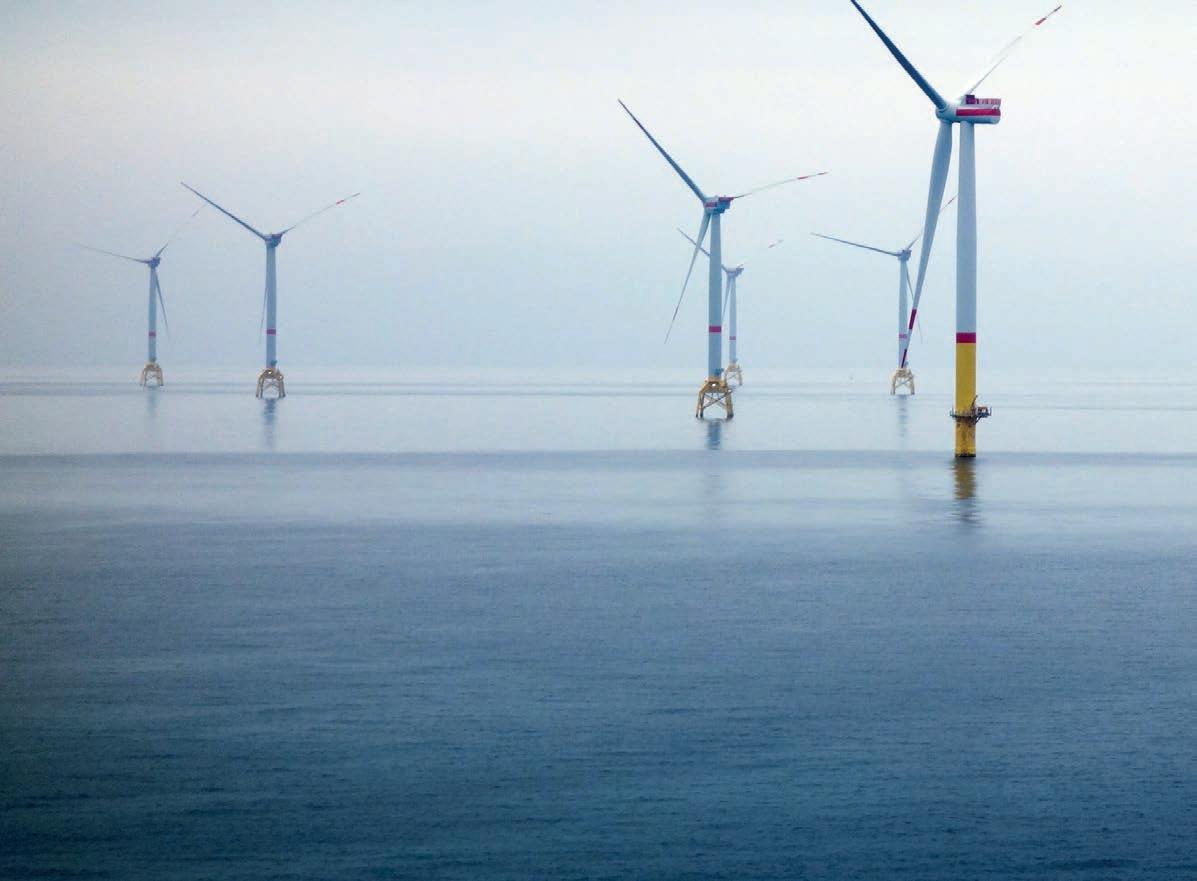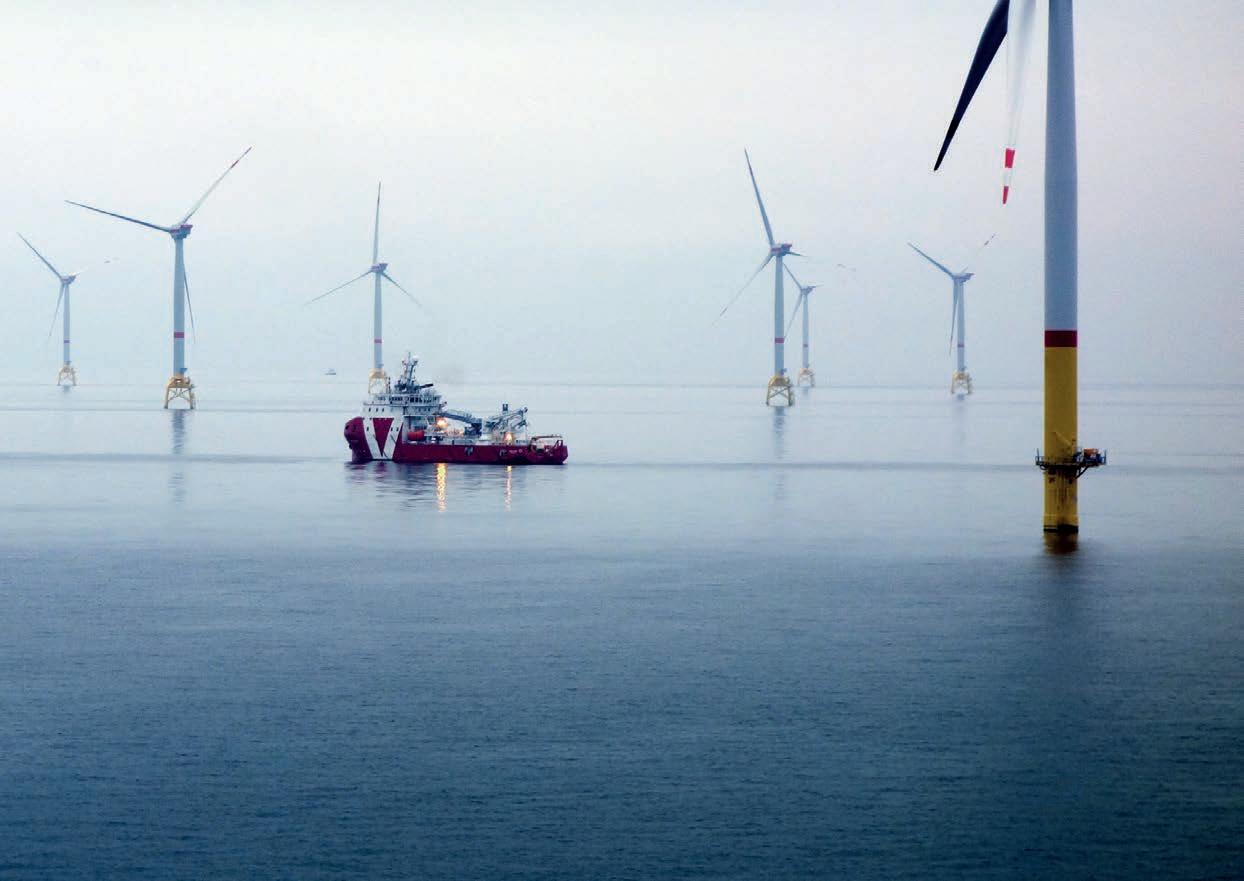
11 minute read
The Impact of a War on Supply Lines: Force Majeure or Frustration?
With the war in Ukraine and widespread introduction of economic sanctions causing significant disruption to world markets for commodities and raw materials, Veronique Buehrlen KC considers the impact on contractual obligations in construction contracts/projects and, specifically, revisits the requirements of the doctrine of frustration.
By Veronique Buehrlen KC
Advertisement
The war in Ukraine and widespread introduction of economic sanctions, both by and against Russia, have and continue to cause significant disruption to world markets for commodities and raw materials. Supply chains, still reeling from the impact of the Covid-19 Pandemic, are seeing further unprecedented disruption – unprecedented since WW2. The rising cost of living in the United Kingdom is nothing on the rising cost of key raw materials for major construction and infrastructure projects. Aluminium, copper, bitumen, pig iron and iron ore used in the manufacture of steel are only some of the raw materials seeing significant price hikes to name but a few. But it is not only price increases that are the problem. We are seeing significant issues in relation to shortages of materials and disruption to procurement routes and processes which are in turn causing or will, in the medium to long term, cause critical delay to major construction projects. Even if the war in Ukraine comes to an end, it seems unlikely that economic sanctions will be lifted in anything approaching the short term.
We are therefore once more pouring over the proper construction of Force Majeure clauses this time to determine where the risk of a war in Ukraine and / or the imposition of economic sanctions fall. Once more change of law clauses are coming to the fore. Suspension and termination of projects are similarly back on the agenda. As commercial and construction lawyers, experience of the Pandemic and its impact on major projects has ensured that this is now well trodden ground. Similarly, Project Management teams are much better versed in how to react and how to try to overcome the impacts of seriously disrupted supply chains. A key doctrine that falls within the armoury of those most seriously affected by the impact of an unforeseen event on their contractual obligations is that of frustration. It therefore merits revisiting. The doctrine saw some outing in English case law in the context of the Pandemic albeit largely in relation to aircraft or other types of leasing – an inevitable consequence perhaps of aircraft being grounded and leisure facilities closed because of the Pandemic. We are, however, now in a different ball park – in some instances compounding significant delays and increased costs caused to Projects by the Pandemic. Contracts drafted post February 2019 that were careful to provide for Covid were not anticipating this.
Contractual provisions and frustration
Before launching on the complex question of whether a contract has been frustrated by an event occurring post execution of the contract, the first question to ask is whether the occurrence of the event has been provided for by the contract. If the contract treats the affected obligation as absolute regardless of any subsequent event that may preclude the doctrine of frustration from getting a look in, although general wording may not be sufficient to capture an unforeseeable event.1 That said, the imposition of absolute obligations is unusual in construction contracts. More likely, particularly in detailed construction contracts executed between experienced
employers, contractors and subcontractors is that the risk of the event occurring has been provided for by the contract, and thus allocated between the parties, such as through the mechanism of a Force Majeure (FM) or change of law clause. If that is the case, then the doctrine of frustration is again unlikely to apply. The wider the ambit of the contractual clauses, the narrower is the practical scope of the doctrine.2 That said, wide wording will not always be sufficient to encompass any event. In Wong Lai Yin v Chinachem Investment Co. Ltd,3 a contract for the construction and subsequent sale of a building contained a FM clause which provided that the Vendor could terminate the contract “should any unforeseen circumstances beyond the Vendor’s control arise”. The works were destroyed by a landslide during construction. The Privy Council held that the clause could not be construed as providing for the possibility of the landslide.

FM clauses invariably identify “war” as an event of Force Majeure but care should be taken not to assume that this means that the war in Ukraine will automatically fall within a particular clause. The applicable case law includes cases where the war in question was found not to fall within the FM clause relied upon. Take Fibrosa Spolka Akeyjna v Fairbairn Lawson Combe Barbour Ltd.4 The FM clause provided for an extension of time to be granted to the supplier of machinery to Poland “should despatch be hindered or delayed … by any cause whatsoever beyond our reasonable control, including … war”. War broke out in September 1939 and Poland was occupied by the Nazis. The House of Lords held that the war contemplated by the FM clause was not of the type that World War II entailed. The clause contemplated a minor delay that could be provided for by an EOT, not the type of prolonged and indefinite interruption to contractual performance that WWII entailed. At the other end of the spectrum, some may seek to argue that the war in Ukraine is no such thing invoking, as Russia has done, Article 51 of the UN Charter. Then again, it may not be necessary to establish whether the conflict meets the definition of “war” if the FM clause extends, for instance, to “hostilities (whether war be declared or not)”.5
Further, a FM clause will in all probability require the supervening event to be the cause of the affected party’s inability to perform. That often leads to complex issues of causation. Where, for instance, a contractor is prevented or hindered from performing its obligations because of severe disruption to its supply chains, the question must be asked: has that disruption been caused by the war in Ukraine or by the economic sanctions regimes imposed by and against Russia and, if the latter, does it make a difference? Each clause falls to be construed according to the terms of the particular contract in question.
The doctrine of frustration
The currently prevailing approach to the doctrine is that it will arise where performance of the contract has been rendered radically different because of a change in circumstances post execution of the contract.6 Chitty On Contracts provides the following definition:
“A contract may be discharged on the ground of frustration when something occurs after the formation of the contract which renders it physically or commercially impossible to fulfil the contract or transforms the obligation to perform into a radically different obligation from that undertaken at the moment of entry into the contract.”7
The legal test stems from a construction case: David Contractors Ltd v Fareham Urban District Council8 that may prove useful by way of analogy to the supply line disruptions that are causing significant increases in costs and delays today. The facts were these: in 1946 the plaintiffs agreed to build 78 houses for the defendant within a period of 8 months. There were significant delays to the build because of a shortage of labour caused by unexpected delays in the demobilisation of troops post WWII and difficulties in obtaining materials. An 8 month project turned into a 22 month project and the contractor incurred an additional 25% in costs. The contractor sought to rely on the doctrine of frustration to establish that the contract had been discharged and to sue for payment based on a quantum meruit. In short, the House of Lords held that, although there had been an unexpected turn of events which rendered the contract more onerous to
2 See Chitty On Contacts 34th Ed at para. 26-003 3 (1979) 13 Build L.R. 81 4 [1943] A.C. 32. 5 See, for instance, the definition of Force Majeure at clause 19.1 of the FIDIC Silver Book 1999, now “Exceptional Events” in the FIDIC suite of contracts (Clause 18), and at clause 15.2(a) of the LOGIC General Conditions of Contract for Construction. For a detailed commentary on the general principles in relation to frustration and the impact of war see Chapter 15 of
Keith Michel’s War, Terror and Carriage by Sea 2004. 6 Davis Contractors Ltd v Fareham Urban District Council [1956] AC 696; National Carriers Ltd v Panalpina (Northern) Ltd [1981] A.C. 675 at p. 688; Canary Wharf (BP4) T1 Ltd v European
Medicines Agency [2019] EWHC 335 Ch, per Marcus Smith J at [26-27]. 7 Chitty On Contract 34th Ed, para. 26-001. 8 [1956] AC 696, 729. See in particular the judgment of Lord Radcliffe at page 729 and Lord Reid at page 723.

perform than had been contemplated by the parties at the time the contract was entered into, that did not mean that the job was different to that contemplated by the contract. Lord Reid’s approach is worth citing: “the question is whether the causes of delay or the delays were fundamental enough to transmute the job the contractor had undertaken into a job of a different kind, which the contract did not contemplate and to which it could not apply”. There are, of course, grounds for distinguishing how the doctrine was applied in Davis Contractors from the supply chain issues that are currently being experienced as a result of the war in Ukraine and associated economic sanctions. However, the case illustrates two things, firstly the test for frustration and secondly how difficult it can be in practice to establish that a contract has been frustrated. That said, difficult does not mean impossible.
The applicable test was restated by the House of Lords in National Carriers Ltd v Panalpina (Northern) Ltd [1981] AC 675 at 700. Frustration arises where the supervening event “so significantly changes the nature of the outstanding contractual rights and/or obligations” that it would be unjust to hold the parties to their bargain in the new circumstances. Mere additional expense and onerousness will not be enough. But what does all this mean in practice? Firstly, one must construe the terms of the contract to determine the scope of the original obligation. That exercise will need to be undertaken in accordance with well accepted principles of contract interpretation. The Court or Tribunal will need to look at what the parties’ obligations entailed in terms (for instance) of time, labour, money and materials. Secondly, the Court or Tribunal will need to establish what the situation, post the supervening event, now requires. Thirdly, a comparison of the original obligation with the new obligation will be required to determine whether the new obligation is a “radical” or “fundamental” change from that undertaken under the contract.
However, it is not just a question of construing the contract. Current case law favours what is described as a “multifactorial” approach to frustration meaning that one must look at all the facts and circumstances of the case. To quote Rix LJ in The Sea Angel:
“In my judgment, the application of the doctrine of frustration required a multi-factorial approach. Among the facts which have to be considered are the terms of the contract itself, its matrix or context, the parties’ knowledge, expectations, assumptions and contemplations, in particular as to risk, as at the time of the contract, at any rate so far as these can be ascribed mutually and objectively, and then the nature of the supervening event, and the parties’ reasonable and objectively ascertainable calculations as to the possibilities of future performance in the new circumstances … the mere incidence of expense or delay or onerousness is not sufficient; and that there has to be as it were a break in identity between the contract as provided for and contemplated and its performance in the new circumstances.”9
This means an in-depth inquiry into the factual matrix at the time the contract was entered into including an investigation of the parties’ knowledge, expectations and assumptions in particular as to risk. It also means the need for a detailed understanding of the consequences of the event on the affected party’s performance of its obligations.
Impossibility of performance presents relatively (being the operative word) few difficulties in the sense that if the obligation has become impossible to perform then the doctrine ought to apply. However, establishing whether an obligation has become impossible to perform may itself be difficult. First the obligation has to be defined. A shortage of materials in the market may make it impossible to complete the construction of a structure by a certain date. However, that impossibility may merely give rise to a delay in performance of the obligation that in itself will not amount to impossibility of performance.
Depending of course on the circumstances of the case, more challenging may be determining whether the supervening event has transformed the original obligation into a radically different obligation to that originally contemplated by the contract. The extent to which the obligation must have changed is uncertain and each case will depend on its own facts. That is because whether the supervening event will have operated to frustrate the contract is in essence a question of degree – an increase in costs, even a significant one, is unlikely without more to be sufficient to trigger the operation of the doctrine. A delay will in turn have to be abnormal if it is to fall outside what the parties might have reasonably contemplated when contracting. Relevant factors will include the nature of the contract, the cause of the delay, its length or probable length and how it impacts the parties’ obligations.
These are the basics but it is safe to assume given the unprecedented events to which supply chains are subject that the doctrine is once more going to play a part.






